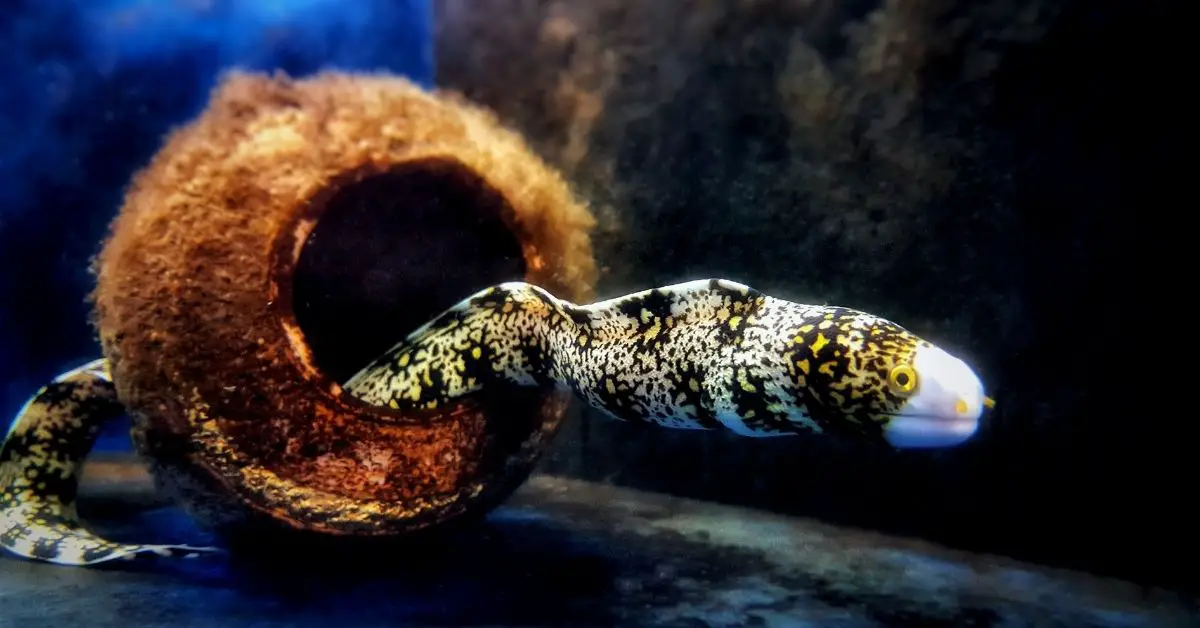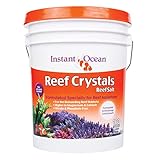As a current or prospective owner of a Snowflake Eel (also known as clouded moray), you already know how cool they are; the way they glide through the water is almost hypnotic – let’s face it, this eel is cool and if you own one, by reciprocity, you are too! But what if your eel friend suddenly stops eating and if so, how long can it go without eating?
Here are some things to check before panicking:
Are you Feeding Your Snowflake Eel a Proper Diet?
What are you feeding your eel? Any knowledgeable Snowflake eel mama or papa knows not to feed this species of eel other fish, especially freshwater fish like Goldfish, because it will cause liver disease.
How often should I feed my snowflake eel?
Snowflake Eel prefers a diet of shrimp, crab, octopus, mussels, silversides, squid, and clams and is to be fed about 2 to 3 times a week at night.
API REEF MASTER TEST KIT Reef Aquarium Water Test Kit 1-Count
(as of July 13, 2024 01:37 GMT +03:00 - More infoProduct prices and availability are accurate as of the date/time indicated and are subject to change. Any price and availability information displayed on [relevant Amazon Site(s), as applicable] at the time of purchase will apply to the purchase of this product.)Instant Ocean Reef Crystals Reef Salt, Formulated Specifically For Reef Fish Tank Aquariums
$66.70 (as of July 13, 2024 01:39 GMT +03:00 - More infoProduct prices and availability are accurate as of the date/time indicated and are subject to change. Any price and availability information displayed on [relevant Amazon Site(s), as applicable] at the time of purchase will apply to the purchase of this product.)Instant Ocean Reef Crystals Reef Salt For 50 Gallons, Enriched Formulation For aquariums
Health Tip: Be sure to thoroughly skim the remaining food after your aggressive, messy eater feeds. If they are left in the tank, they break down and become toxic to every inhabitant of the tank. Science is fun, isn’t it?
Feeding Tip: Another characteristic of the Snowflake Eel is his teeth; ideal for aggressively crushing his crunchy seafood prey into bits in a single bite. Add this to the fact they have poor eyesight, I recommend getting feeding tongs if you wish to keep all of your digits intact.
Why my snowflake eel not eat?
But what if you notice your Snowflake Eel, has stopped eating altogether? How long can this eel go without eating? One day you try to feed the Eel some of his favorite yummy clams and he won’t even swim near the feeding tongs to see what’s on the menu.
You try and try again to feed your eel but to no avail. The next day comes with the same result; before you know it a week passed and the Eel still hasn’t eaten.
Your squiggly, stubborn saltwater friend is not sick; this is simply something Snowflake Eels do. It’s time for the tried and true “hunger strike”. If the Eel could, imagine him holding a tiny sign in his tiny little fin and swimming around the tank defiantly; the tiny sign reads:
“No Ma’am, No More Clams” or “Shrimp is for Wimps” or more aptly “Leave Me Be, I’m Not Hungry”. If a Snowflake Eel is full, it could be a few weeks to months before they eat.
This doesn’t mean you should stop trying to feed the Eel. You should know eel may simply be happy burrowing underneath the filter or aquarium sand or hiding under the coral, sort of like a bear hibernating after they have stolen and gobbled up all of the goodies from all of the proverbial “pic-a-nic baskets” in Jellystone National Park ala Yogi Bear and his good old pal Boo Boo.
If you have had your eel friend for longer than 5 years, there is no need to panic. Chances are your eel has exhibited this type of behavior before and he will eat when he gets hungry. If you want to try the “tough love” method, try not feeding them for a week, then try again. Feed, wait and repeat.
Other Solutions to Try:
Mix it Up
If you were feeding eel freeze-dried food, a live main course may be more appetizing and appealing to this nighttime predator as they like to ambush their live prey in the ocean. Try feeding them late at night with some fresh crab, some ghost shrimp, or scallops straight from the seafood market. Fresh food is more nutrient-rich and has more vitamins than its freeze-dried counterparts.
Remember your eel has poor eyesight. The bigger and more squiggly the dinner, the more likely he will be to see it and grab it. I am sure it can be very unnerving for the owner of a Snowflake Eel to witness the eel not eating day in and day out. You don’t want them to starve; after all, they are your wet little pet.
Check for Ideal Tank Conditions:
- Proper pH-level: All marine life will thrive in a well-maintained tank. If your eel hasn’t eaten for a prolonged period, another thing you can do is to check your tanks’ pH level; if your pH level is below 8, the water conditions are too acidic for a reef/saltwater tank and its habitants; bump the pH level up to 8 to 8.4.
- Proper water temperature: The proper water temperature for a reef/saltwater tank is between 70 and 80 degrees
- Eel-proof the tank: Since this species of eel is a well-known escape artist and can live outside of the tank for up to 12 hours, be sure that the aquarium’s lid is on and that it is nice and tight. If you keep the lid off your tank or it is loose-fitting, your eel may have escaped the tank; no wonder he doesn’t come out to eat – he’s on vacation.
Take a Head/Tail Count:
If considerable time has passed and your eel still hasn’t eaten, you may want to take a headcount of every tank inhabitant. If a Snowflake Eel gets hungry enough they will feed on anything alive and handy. If any fish are missing or some parts of your fish are missing, (blech) and you have no other predatory tank mates, contact the place of purchase for advice.
Conclusion
Don’t panic. If your new eel still hasn’t eaten after about 3 weeks, and you have tried all the other possible solutions discussed above, you may want to call the pet shop/aquarium where you purchased them or a vet that specializes in saltwater eels for some advice just for your peace of mind. Patience often wins the day when dealing with feeding a beautiful but stubborn Snowflake Eel.
References:
Moray Eels Are Uniquely Equipped to Pack Big Prey Into Their Narrow Bodies: https://www.nsf.gov/news/news_summ.jsp?cntn_id=109985





















